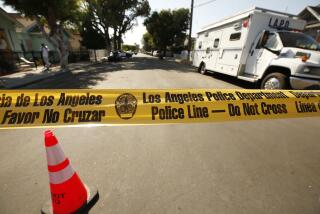Untie LAPD’s Hands to Fight Terrorism : If Mayor Riordan stands tough against the ACLU types, maybe Chief Williams will, too.
- Share via
The arrests on Thursday of white supremacists linked to a plot to bomb the First AME Church and to assasinate Rodney King and other public figures mark the arrival in Los Angeles of a new twist on terrorism: the resurgence of domestic terrorism in the wake of the arrival of international terrorism on our shores.
The focus on the FBI’s success at infiltrating local groups plotting terrorism, however, overshadows the deep, continuing dangers facing us here in Los Angeles. With our population of 4 million just a stone’s throw from a porous international border, our city is the rational next choice for the publicity-hungry terrorist.
Compounding the problem posed by the allure of Los Angeles as a target is the distressing, but largely unspoken, fact that the Los Angeles Police Department lacks the intelligence-gathering capabilities that are critical to efforts to counter sophisticated terrorism at any level.
The inadequacies in the LAPD’s intelligence capabilities were evident in the department’s total failure to anticipate the civil disorder that followed the King case verdicts last year, as confirmed by the Webster Commission’s exhaustive subsequent investigation. Further evidence of these inadequacies: The LAPD had only a nominal role in the roundup of the alleged white supremacists.
The blame for these structural inadequacies, however, does not rest with the department, but rather with the political process that has so severely restricted the LAPD’s intelligence operations over the past decade. That process began with the 1983 decision to dismantle the Public Disorder Intelligence Division in the face of a lawsuit that alleged political spying, a decision that reverberated through all of the department’s intelligence operations.
More recently, the department has been the subject of a court consent decree severely restricting the operations of the Anti-Terrorist Division, and has, in the face of political pressure, closed down the Organized Crime Intelligence Division, only later to reopen it in a gutted, and essentially unrecognizable, form.
The net effect of these three political decisions is that the LAPD’s intelligence capabilities are subject to several layers of politically imposed limitations not seen in other large municipal police departments, limitations that pose significant risks in terms of public safety. Example:
The detective investigating a routine robbery is permitted to question and investigate potential suspects as part of the attempt to make a case; her counterpart in the Anti-Terrorist Division is not, having had his hands tied by city politics.
Under the nebulous ATD guidelines, investigators must show probable cause in excess of the standard that applies in virtually every other law-enforcement agency, and must channel this showing through a burdensome and lengthy screening process. Compounding this problem are the restrictions that the guidelines place on the division’s ability to catalogue and analyze information. Because the effective use of intelligence requires a system of storing and analyzing leads and information from unrelated sources, this restriction deals an additional blow to the ATD’s effectiveness. In no other area of public safety would we tolerate politically imposed limitations of this kind, and the obvious risks they pose.
Given its history of controversy, any steps toward enhancing the LAPD’s intelligence apparatus, even to counter the heightened threat of terrorism, will meet with great resistance from the anti-police crowd that has recently dominated LAPD policy. However, the controversies of the past cannot be allowed to obscure the critical needs of the present.
The political Establishment must disabuse itself of the politically correct, but potentially deadly, notion that there is something morally wrong with a local police force lawfully gathering intelligence from the community that it serves. Information, an indispensable element of counter-terrorism, is not deprived of its legitimacy simply because it is gathered and used by a local police force.
The potential for terrorism must be included at the top of the list of the major crime problems that the city now faces. Mayor Richard Riordan appears to have the determination and political conviction to embark upon a course of difficult changes in the LAPD in order to address the scourge of crime that threatens the soul of this city. With a little political pressure to resist the rantings of the ACLU-types, Chief Willie Williams might follow suit and unleash the department’s capabilities to fight terrorism.
More to Read
Sign up for Essential California
The most important California stories and recommendations in your inbox every morning.
You may occasionally receive promotional content from the Los Angeles Times.










